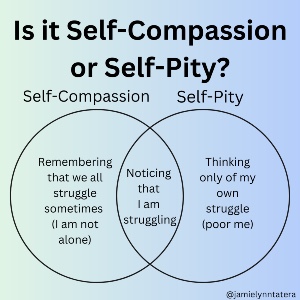If I’m self-compassionate, does that mean I feel sorry for myself?
It’s a common fear that self-compassion will lead to self-pity (for ourselves or our kids). What differentiates self-compassion from self-pity? And what makes one resilience boosting and the other resilience depleting?
It’s easier to understand self-compassion/self-pity within the context of compassion/pity in general.
An Example of Pity and Compassion
If I see someone homeless on the street who looks cold, and I think, “Wow! That person is having a bad life. I’m glad that’s not me!!” I will experience the emotion of pity. They are suffering, and they are different from me. Even if I try to help, it will come from a place of pity.
Now notice how a compassionate thought sets the stage differently, “Wow! That person looks like they are suffering. That could be me if my life circumstances were different.” From this place, I experience connection. This feeling of connection transforms pity into compassion.
Self-Pity and Self-Compassion
Bringing this same sense of connection to our personal struggles creates a foundation for self-compassion.
Consider this self-pitying thought, “Poor me. I’m having such an awful life.” Adding in an element of connection can help us experience self-compassion: “I’m having a difficult time, and others sometimes struggle like this, too.”
We all experience self-pity from time-to-time, and we can meet self-pity with compassion. But whereas wallowing in self-pity will make us feel disempowered, self-compassion sets the stage for a nurturing response and empowered action.

Applying Self-Compassion to Our Parenting/Caregiving
The ultimate goal of my work is to help caregivers help children grow self-compassion. That being said, we can’t give away what we haven’t got. So we’ve got to begin by helping ourselves grow self-compassion.
Let’s face it, being a parent can be hard! When we have kids with extra struggles (physically, emotionally, or socially) the task can be even harder. So just how do we help ourselves experience connection and self-compassion in the midst of struggles?
A Personal Example
My children have been going through an arguing phase where they argue more than normal. This is stressful for me as a parent, and I feel empathy for the sadness and stress that their arguments cause one another.
The other day I was pondering their relationship on a walk. Because my daughters typically have a strong connection and have years of practice seeing one other’s perspectives, there’s nothing that I need to “do” to help to resolve the situation. Instead I reminded myself that all siblings go through phases of having more and less conflict. This is hard, but I am not alone in this experience, and it’s not my fault.
Growing Self-Compassion Together
It’s easier to grow self-compassionate connection when we are together in community experiencing the commonality of our struggles in real time. One of my hopes for this “Substack” newsletter is that we can connect with one another in both our common parenting struggles as well as our resilience-boosting “successes.”
I would love it if you shared your comments or questions by clicking on the comment button, and I also have plans to create a Q & A thread for my newsletter so we can learn and grow together.
And of course there’s an opportunity to grow self-compassion in community with others through taking one of my resilience-boosting classes: Parent-Child Self-Compassion, Resilient Parenting, or the adult Mindful Self-Compassion training (all three begin in January!).
Thank you for being a part of our community.
Wishing you light and love,
Jamie Lynn
